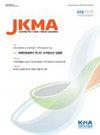长期covid时代的医疗应对策略
IF 0.5
Q3 MEDICINE, GENERAL & INTERNAL
引用次数: 0
摘要
背景:2019年底首次报道的冠状病毒病(COVID-19)具有广泛的临床表现,从无症状到多器官功能障碍。这些症状可能在急性期过去后仍然存在。COVID-19急性后综合征(long-COVID)是一种以COVID-19症状在感染后持续两个月以上为特征的病症。疲劳、肌肉和关节疼痛、呼吸困难、认知障碍和焦虑是长期covid的最常见症状。鉴于2019冠状病毒病后遗症对幸存者生活质量的重大影响及其社会经济负担,需要采取积极措施。当前理念:在确定长期covid特征和症状之后,建议以患者为中心的基于疫苗接种,COVID-19药物和数字医疗保健的护理。此外,呼吸功能障碍患者或老年人等更容易感染covid - 19的人群需要更专业和更周到的管理。大数据和人工智能有望更及时、更有效地应对这一医疗问题。讨论与结论:传染病不断威胁着我们的生命,最近的COVID-19大流行及其挥之不去的后果就是明证。新型病毒可以在任何时间和地点出现,造成重大的临床和经济损失。在这个阶段,必须制定迅速有效的战略,以应对长期covid和潜在的大流行病。本文章由计算机程序翻译,如有差异,请以英文原文为准。
Healthcare response strategies for the long-COVID era
Background: Coronavirus disease (COVID-19), first reported at the end of 2019, is characterized by a broad spectrum of clinical manifestations ranging from asymptomatic to multi-organ dysfunction. These symptoms may persist even after the acute phase has passed. Post-acute COVID-19 syndrome (long-COVID) is a condition characterized by COVID-19 symptoms that persist for longer than two months after infection. Fatigue, muscle and joint pain, dyspnea, cognitive impairment, and anxiety are the most common symptoms of long-COVID. Given the substantial impact of COVID-19 sequelae on the quality of life of its survivors, as well as its socioeconomic burden, proactive measures are required.Current Concepts: Following the identification of long-COVID characteristics and symptoms, patient-centered care based on vaccination, COVID-19 medications, and digital healthcare is recommended. Furthermore, people who are more vulnerable to long-COVID, such as those with respiratory dysfunctions or the older adults, require more specialized and attentive management. Big data and artificial intelligence will hopefully enable a more timely and effective response to this healthcare issue.Discussion and Conclusion: Infectious diseases threaten our lives constantly, as evidenced by the recent COVID-19 pandemic and its lingering consequences. A novel virus can emerge at any time and place, resulting in substantial clinical and economic loss. At this stage, it is crucial to establish prompt and effective strategies against long-COVID, as well as against potential pandemics.
求助全文
通过发布文献求助,成功后即可免费获取论文全文。
去求助
来源期刊

Journal of The Korean Medical Association
Medicine-General Medicine
CiteScore
0.50
自引率
0.00%
发文量
84
审稿时长
4-8 weeks
期刊介绍:
The Journal of the Korean Medical Association (JKMA) is the official peer-reviewed, open-access, monthly journal of the Korean Medical Association (KMA). It contains articles in Korean or English. Its abbreviated title is ''J Korean Med Assoc''. The aims of the Journal include contributing to the treatment of and preventing diseases of public health importance and to improvement of health and quality of life through sharing the state-of the-art scientific information on medicine by the members of KMA and other national and international societies.
 求助内容:
求助内容: 应助结果提醒方式:
应助结果提醒方式:


